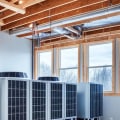As an HVAC expert with years of experience, I have encountered numerous homeowners struggling with their air conditioning systems. One of the most common issues that I have come across is when the AC unit stops cooling the house. Many people mistakenly believe that the AC is responsible for cooling the air, but in reality, it removes heat from the house to make it feel cooler. This may seem like a small distinction, but it is a crucial concept to understand if you want to know how your AC works. The AC system is like a circulatory system that transports coolant through various components to remove heat from the inside and transfer it outside.
The refrigerant is pressurized by the compressor unit and changes state from liquid to gas and vice versa. If your HVAC system runs continuously throughout the season, it can wear out and eventually burn out. One of the common causes of this is a faulty fan motor or fan assembly. When these parts fail, there will be no air force treated through the ducts, and you will notice this if you place your hand on the ventilation grille. However, this problem can be easily detected during regular annual maintenance. If your fan is wearing out, you may hear strange noises like crackling or rattling when it rotates.
As for the evaporator coils, they play a crucial role in the cooling process. They work efficiently when they are clean, but if they get dirty, their efficiency decreases. That's why it is essential to clean them regularly to remove any accumulated dust, dirt, and debris. Neglecting this task can lead to corrosion of the coils, which can eventually cause them to fail completely.
In such cases, the only solution is to replace them with new components. This is why inspecting and cleaning the coils should be included in your annual AC maintenance routine. Another often overlooked but vital component of an AC unit is the air filter. These filters are inexpensive, but they play a crucial role in the overall functioning of your HVAC system. A clogged air filter can cause a wide range of problems, so it is essential to check it regularly and make sure it is not covered with dust, dirt, pet dander, or other contaminants.
If it is dirty, it should be changed every 3 to 6 months, depending on your usage. If you have pets in your home, you may need to change the filter more frequently due to excess pet hair. You can find detailed instructions on how to locate, change, or clean the air filter in your owner's manual. It is crucial to identify faulty components early on as it can improve your indoor comfort levels and save you money in the long run. When these parts start to fail, they tend to reduce the performance and energy efficiency of your AC, which can lead to higher utility bills.
And as the problem worsens over time, the cost of repair or replacement also increases. In extreme cases, a neglected HVAC system may have to be replaced sooner than expected. On average, an AC unit has a lifespan of 10-15 years, but well-maintained equipment can last even longer. Every year you can avoid a replacement, you'll have more money in your pocket. That's why investing in regular AC maintenance is crucial and can save you a lot of money in the long run. Out of all the components in an AC unit, the compressor is the one that runs for the longest hours per year.
This makes it more prone to wear and tear and often one of the first parts that need replacement. The lifespan of a compressor usually depends on the daily operating hours of your system, which is directly related to the local climate. Replacing an AC compressor is not only labor-intensive, but refrigerant is also a costly product. This is why it is crucial to replace your air filter regularly, as it is not only the first part that needs replacement, but it also helps in prolonging the lifespan of your AC unit.


